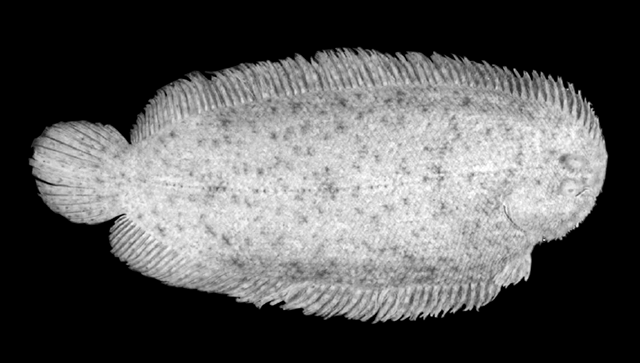| Soleidae (Soles) |
| 10.2 cm SL (male/unsexed) |
|
demersal; brackish; marine; depth range 4 - 10 m |
| Southwestern Pacific: New South Wales, Australia. |
|
Dorsal soft rays (total): 62-70; Anal soft rays: 46-52; Vertebrae: 36-38. Diagnosis: Dorsal rays 62-70; anal rays 46-52; dorsal and anal rays branched. Lateral-line scales 62-68. including 8-9 anterior to a vertical at upper end of gill opening. Vertebrae 36-38; dorsal pterygiophores anterior to fourth neural spine 8-9. Body depth 2.4-2.65 in SL; head short, its length (HL) 4.75-5.05 in SL; eye diameter 4.6-5.7 in HL; upper eye overlapping about anterior one-third to one-half of lower eye; interorbital space variable in width; vertical distance separating eyes 7.3-13.7 in HL. Caudal peduncle absent. Lappet-like cirri on ventral edge of head, but not on front of snout; numerous cirri on opercular edge of gill opening on both sides; dense cirri over much of ventral part of head; exposed surface of scales overlaid with soft tissue; only tips of cirri visible at scale margins, capped with soft tissue; lateral-line scales with fleshy cirri, often one above and one below pore (cirri better developed on ocular than blind side); scattered other scales with a slender fleshy cirrus, often one from each corner of scale; membranous ridges of both sides of dorsal and anal rays with a conspicuous fringe of cirri. Some of which are bifid. Lateral line aligned with upper eye. Longest dorsal ray 1.65-1.8 in HL. Caudal fin rounded, its length 4.6-5.05 in SL; pelvic fins short, 1.8-2.2 in HL, the tip of longest ray reaching base of second anal ray. Ocular side light brown, with scattered small dark brown blotches; rays of fins with small dark brown spots (Ref. 57560). |
| Collected from sand in bays (Ref. 57560). |
|
Data deficient (DD); Date assessed: 06 August 2020 Ref. (130435)
|
| harmless |
Source and more info: www.fishbase.org. For personal, classroom, and other internal use only. Not for publication.

